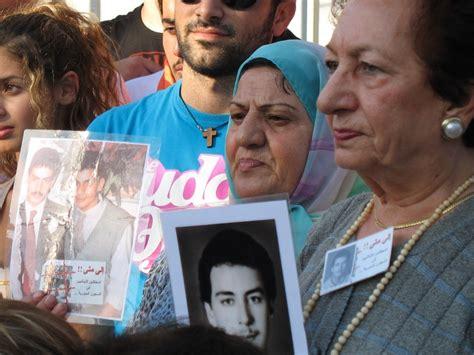
Amnesty highlights missing persons crisis in Lebanon, Syria, Iraq, and Yemen
Amnesty International called Wednesday on Lebanon, Syria, Iraq and Yemen to reveal the fate of people missing in decades of war and unrest, to mark International Day for the Disappeared.
The four Middle East states “have a very large population of missing and disappeared people,” Amnesty’s Aya Majzoub told AFP at an event with families of the missing in Beirut.
Yet “respective governments have failed to take any action to ensure the rights of the families,” she added.
These are also “countries where the families themselves have organised and led on campaigns and advocacy demanding their rights,” Majzoub said.
In Iraq, the United Nations estimates that between 250,000 and one million people have been “disappeared” since 1968, “making it one of the countries with the highest number of disappearances in the world,” an Amnesty statement said.
Disappearances are still carried out today by government-affiliated militias, the rights group added.
Widad Shammari of the Iraqi Al Haq Foundation for Human Rights, whose son has been missing since 2006, said she was a lone protester “until I met many like me who shared my struggle.”
In Syria, tens of thousands are believed to be missing, or disappeared in jails run by various sides of the 12-year conflict — chief among them the Syrian government.
“We had big dreams in 2011. But we paid a very heavy price,” said former regime detainee Fadwa Mahmoud of Families for Freedom.
In 2012, Syrian authorities arrested her husband Abdel Aziz Khayer, a dissident, and their son Maher Tahan. She has not heard from them since.
In June, the UN General Assembly created an independent body to “clarify” the fate of those missing in Syria since war broke out.
In Yemen, human rights groups have documented 1,547 cases of missing and disappeared persons since 2015.
The conflict there broke out in 2014 when Iran-backed Houthis seized the capital Sanaa, prompting a Arab-led coalition to intervene the following year to prop up the internationally recognized government.
“We have pledged to keep fighting until the last detainee is freed,” said Najla Fadel, an activist with the Abductees’ Mothers Association, despite group members enduring “threats and beatings” during protests.
Lebanon’s 1975-1990 civil war saw 17,415 people go missing, Amnesty said, citing official figures.
“We will not give up our rights,” Wadad Halwani, who heads the Committee of the Families of the Kidnapped and Missing, in Lebanon, told AFP.
Source » alarabiya.net





